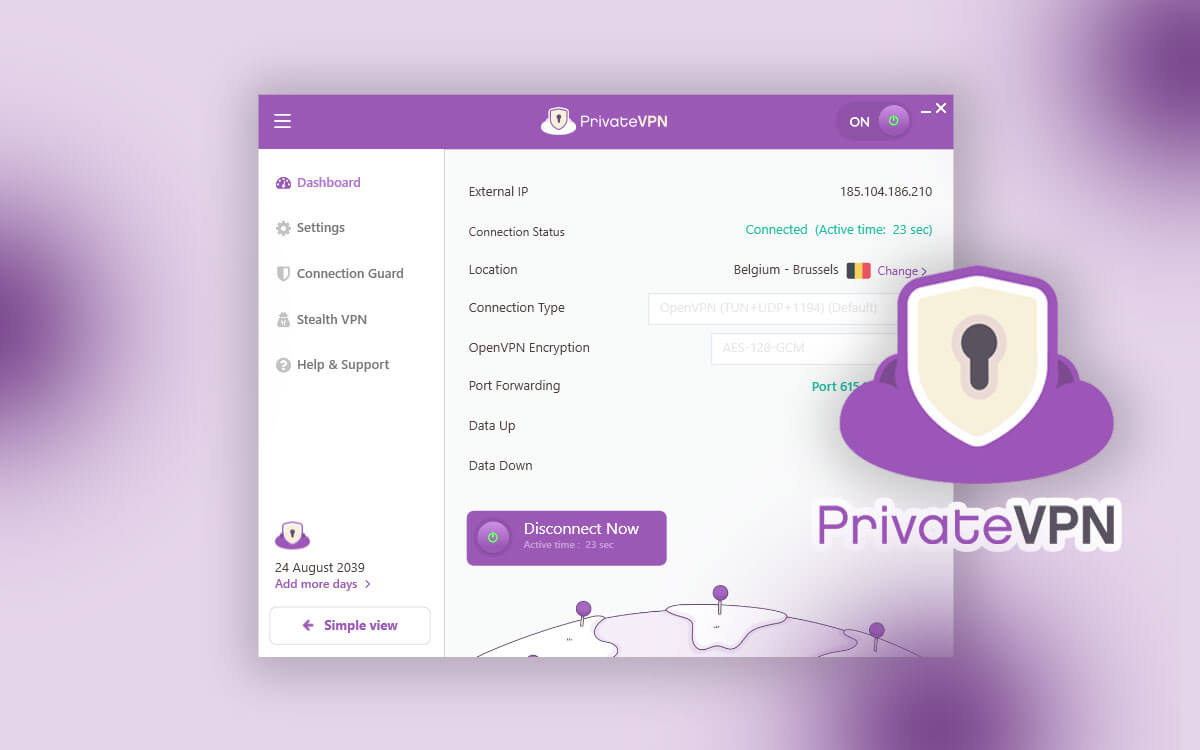PrivateVPN Review: A Solid Yet Stagnant Choice for Privacy and Streaming
PrivateVPN, a Sweden-based VPN provider, has garnered attention with its tagline “unlock anything, protect everything.

PrivateVPN, a Sweden-based VPN provider, has garnered attention with its tagline “unlock anything, protect everything.” This simple but powerful promise appeals to many users, delivering both privacy and access to geo-restricted content. Established in 2009, PrivateVPN has managed to build a loyal user base thanks to its user-friendly interface, solid feature set, and competitive pricing.
While it isn’t as feature-rich as some of its larger competitors, it has carved out a niche for users seeking reliable VPN access for streaming, secure browsing, and professional use. With over 200 servers across 63 countries, the service promises robust protection, but its shortcomings in certain areas raise concerns for privacy-conscious users.
Easy-to-Use Interface
Upon launching PrivateVPN’s Windows app, users are greeted with two interface modes: Simple and Advanced. By default, the app opens in Simple mode, providing a minimalist design that’s easy to navigate. The center of the window features a prominent “Connect” or “Disconnect” button, along with a location tile to change servers. After connecting, a timer displays the duration of the session, offering a straightforward experience for those who just want a simple VPN connection without hassle.
For users who seek more control over their VPN settings, the Advanced mode unlocks a range of additional options. From this view, users can choose between different VPN protocols and encryption levels, view data usage, and fine-tune various connection settings. In addition, the Settings menu allows for custom configurations, such as automatic startup and language preferences.
PrivateVPN also includes useful security features like IPv6 and DNS leak protection, and a kill switch that cuts off internet access if the VPN connection drops. The app allows users to set up individual apps to terminate when the VPN connection is lost, which can be particularly helpful for maintaining privacy. Moreover, the “Stealth VPN” mode lets users bypass VPN blocks and deep packet inspection (DPI) firewalls, a handy feature for those in restrictive countries.
A Solid Foundation, But Room for Improvement
While PrivateVPN offers a solid foundation, it hasn’t seen much innovation in recent years. The absence of advanced features like split tunneling or multi-hop connections, and the lack of support for WireGuard, is notable. These shortcomings may deter tech-savvy users looking for more robust and modern VPN options. WireGuard, in particular, has become the preferred protocol due to its superior speed and security, and its absence in PrivateVPN’s list of supported protocols is perplexing.
Affordable Pricing
PrivateVPN stands out for its competitive pricing structure. Its monthly subscription costs $9.99, which is on the lower end compared to industry standards. For users willing to commit long-term, the three-year subscription plan offers an exceptionally low price of $72, or $2 per month. However, the lack of a one- or two-year subscription plan may discourage some users, as three years is a significant commitment, especially in a competitive VPN market.
Despite this, the service remains affordable, especially for those who are comfortable with a monthly plan. The pricing is in line with many competitors, making PrivateVPN an attractive option for budget-conscious users.
Speed and Performance
During testing, PrivateVPN’s performance was relatively unremarkable. Download speeds averaged around 37% of the baseline, which is typical for many VPN services. However, its upload speeds were much better, clocking in at 65% of the baseline. This makes PrivateVPN a solid choice for general browsing and torrenting, though it excels more in professional use, such as video chats or sharing large files. Its speed performance is certainly adequate, but not extraordinary.
Streaming performance is one area where PrivateVPN shines. It successfully unblocked popular streaming services like Netflix, even with its strict anti-VPN measures. However, the limited number of servers may make it difficult to access content in certain regions, especially for travelers.
Privacy and Security
PrivateVPN adheres to a strict no-logs policy, ensuring that it does not track user activity or store any identifiable information during your VPN sessions. However, it does collect some data through cookies on its website for account-related purposes. This is common among VPN providers, but users concerned with privacy should be aware of the implications.
While PrivateVPN offers strong encryption, it does not include WireGuard by default, which remains a missed opportunity. Instead, it supports older protocols like OpenVPN, PPTP, and L2TP. Users can manually configure WireGuard, but the fact that it isn’t integrated is a drawback, given its popularity among privacy-focused users.
PrivateVPN’s base in Sweden, a member of the 14 Eyes intelligence-sharing alliance, raises concerns about potential data-sharing obligations with governments. This could be an issue for users who prioritize strict privacy protections, as the Swedish government may have legal access to certain types of data.
Conclusion: A Dependable Yet Outdated Option
PrivateVPN is a reliable VPN service with many strengths, including ease of use, good streaming capabilities, and a solid privacy policy. Its affordable pricing makes it an attractive option for many users, particularly those seeking basic protection and access to geo-restricted content. However, its lack of new features, limited server network, and absence of WireGuard support may make it less appealing to power users and privacy-conscious individuals.
For users who are looking for a simple, affordable VPN with a good balance of performance and security, PrivateVPN remains a solid choice. However, it is increasingly losing ground to competitors that offer more advanced features and faster speeds. If PrivateVPN hopes to remain competitive in the long run, it will need to innovate and update its offerings to keep up with the rapidly evolving VPN landscape.
Editor’s Note: This review is based on the current state of the service. As online services frequently evolve with new features and performance improvements, the review may be updated to reflect these changes. Any modifications will be noted at the top of this article.







